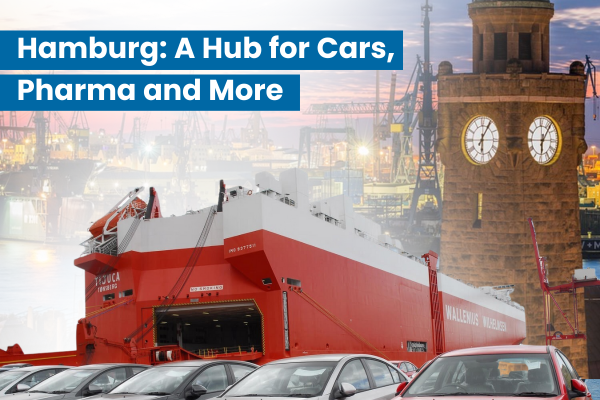The Port of Hamburg is Germany’s largest seaport and Europe’s third-largest container hub, playing a pivotal role in the continent’s logistics and supply chain networks. This strategic gateway handles approximately 8.7 million TEUs (twenty-foot equivalent units) annually.
Germany is the EU’s largest economy and its relationship with Australia is substantial – it is our 11th largest trading partner, with annual two-way trade totalling around $30 billion. Germany is also Australia’s sixth largest source of imports, comprising mostly medical goods, machinery, and cars.
Medical Goods: Germany is Australia’s second-largest source of pharmaceutical products. Packaged medicaments, vaccines, blood, and medical supplies are key imports. These imports are governed by the Therapeutic Goods Administration (TGA).
Machinery: High-quality specialized machinery and mechanical appliances are significant German exports to Australia, including heavy-duty equipment used in various industries.
Automotive: Germany is known for producing high-quality vehicles, including luxury brands like BMW, Mercedes-Benz, Audi, and Porsche. If you’re considering importing a car from Germany to Australia, understanding the process, costs, and legal requirements is essential for a smooth experience.
The official Australian Customs (ABF) website cautions you not to make arrangements to import a road vehicle to Australia until you have been issued with one of the four available types of approvals.
This is where the services of a professional Broker such as Colless Young become indispensable. To import a car from Germany, you must first obtain a Vehicle Import Approval (VIA) from the Department of Infrastructure. Once that is done, we can arrange transport by either containerised freight or on a Roll-On Roll-Off vessel (Ro/Ro), from Hamburg to all major Australian ports.
When doing your sums, you need to budget for Customs duty – typically 5% of the vehicle’s customs value (unless exemptions apply) – plus GST, and potentially the Luxury Car Tax applicable to some German prestige autos. You should also be aware of strict quarantine, environmental, and safety regulations, including asbestos testing and removal requirements.
Although Australia is yet to conclude a Free Trade Agreement (FTA) with the EU as a trading bloc, we have strong commercial relationships with Germany, with numerous bilateral agreements in place. The Australian Embassy in Germany promotes cooperation on social security, double taxation, trade, and cultural cooperation. We also work closely in several multilateral forums, including the UN and G20.
The Port of Hamburg’s central location – seamlessly connecting the modes of sea, rail, and road transport – makes it an essential link in the supply chain for goods originating not just from within Germany, but anywhere in the European Union.
If you are importing from Hamburg or elsewhere in Germany, talk to us at Colless Young first for full details on shipping and Customs clearance. Call Andrew, Tel: +61 7 3890 0800 email enq@collessyoung.com.au

